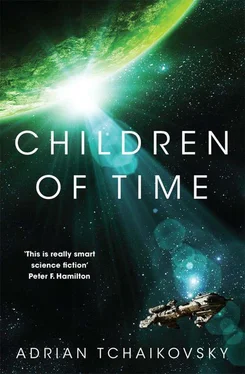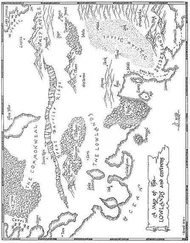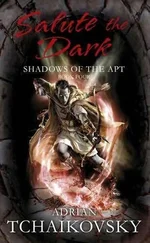Slowly, however, a rapport with the godhead was established by Portia’s forebears, and a story was thus told. Late in the development of their culture therefore, Portia’s people inherited a creation myth, and had their destiny dictated to them by a being of a power and an origin that passed all their understandings.
The Messenger was the last survivor of an earlier age of the universe, they were told. In the final throes of that age, it was the Messenger who was chosen to come to this world and engender life out of the barren earth. The Messenger – the Goddess of the green planet – remade the world so that it would give rise to that life, next seeded it with plants and trees, and then with the lesser animals. On the last day of the previous age, at the apex of creation, the Messenger dispatched Portia’s distant ancestors to this world, and settled back to await their voices.
And, after so many generations of silence in which the Messenger’s voice alone touched the strands of that invisible world-spanning web, the temples now sing back, and the balance of God’s plan is parcelled out in piecemeal revelations that almost nobody can yet understand. The Messenger is trying to teach them how to live, and this involves building machines to accomplish purposes that Portia’s people can hardly grasp. It involves dangerous forces – such as the spark that sends signals up the strands of the ether to the Messenger, but of a vastly greater power. It involves bizarre, mind-hurting concepts of nested wheels and eyes, fires and channelled lightning. The Messenger is trying to help them, but its people are unworthy, so preaches the Temple – why else would they fail their God so often? They must improve and become what God has planned for them, but their manner of life and building and invention is wholly at odds with the vision that the Messenger relates to them.
Portia and her sisters are often in contact with the temples of other cities, but they are nevertheless drawing apart. God speaks to each of them, each temple being assigned its own frequency, but the message substantially the same – for Portia has eavesdropped on God’s dictates to others before. Each temple translates the good news differently; interprets the words and co-opts them to fit with existing mental structures. Worse, some temples are losing their faith entirely, beginning to recast the words of the Messenger as something other than divine. This is a heresy, and already there has been conflict. After all, that tiny point of moving light is their only connection to a greater universe which – they are told – they are destined to inherit. To question and alienate that swift star could leave them abandoned and alone in the cosmos.
By the end of the day, between reports and the Understanding the male has just gifted to her, she has caught up with what has transpired in her absence. Friction with the apostate Seven Trees temple is high, and there has been serious infringement at the mine sites. The demands of God mean that raw materials – metals especially – are in high demand. Great Nest has maintained a monopoly of all good veins of iron and copper, gold and silver anywhere near its ever-extending reach, but other cities constantly dispute this, by sending their own ant colonies out in column to raid the workings. It is a war where the weapons, so far, have been more efficiently bred miners rather than fiercer warriors, but Portia is aware that this cannot continue. God herself has stated, in one of those long philosophical diatribes She is partial to, that there is always a single end-point to conflict if neither side will pull back from the brink.
Spider has always killed spider. From the start, the species has had a streak of cannibalism, especially female against male, and they have often struggled for territory, for local dominance. Such killings have never been casual or common, however. The nanovirus that runs through each of them forms another web of connections, reminding each of the sentience of the other. Even males partake: even their little deaths have a meaning and a significance that cannot be denied. Certainly the spiders have never fallen so far as to practise widespread slaughter. They have reserved their wars for defending themselves against extra-species threats, such as that long-ago war against the ant super-colony that in the end proved such a boost for their technology. For a species that thinks naturally in terms of interconnected networks and systems, the idea of a war of conquest and extermination – rather than a campaign of conversion, subversion and co-option – does not come easily.
God has other ideas, however, and the superiority of God’s ideas has become a major point of dogma for the Temple – after all, why would anyone need a temple otherwise?
When she is finally on top of developments both theological and political; when she has been capsuled out of the city limits to visit the divine workshops where her priest-engineers labour to try and make real something – anything – from God’s perplexing designs, only then does she find time for a personal errand. For Portia, personal and priestly are almost always interwoven, but in this she is indulging herself: finding time to meet with one little mind amongst so many, and yet such a jewel of clarity. Several of the key moments of epiphany, in which God’s message was untangled even slightly, have originated with this remarkable brain. And yet she feels a tug of shame in spending her time in travelling to this little-remarked laboratory where her unacknowledged protégé is given the chance to experiment and build without the rigid control that the Temple traditionally exerts.
She enters without fanfare, finding the object of her curiosity studying the latest results, a complex notation of chemical analysis woven automatically by one of the ant colonies of the city. Interrupted by her presence, the scientist turns and waves palps in complex genuflection, a dance of respect, subservience and pleading.
Fabian , she addresses him, and the male shivers and bobs.
Before coming here, Portia has been to the outer laboratories to view the progress on God’s plan, and she is not heartened.
The history of the Messenger’s contact with Her chosen is the enactment of a plan. Once the language barrier was breached – as it is still being breached, missive to missive – God wasted no time in establishing Her place in the cosmos. There was, at the time, some debate amongst the scholars, but against a voice from the stars that promised them a universe grander than anything they had imagined, what could the sceptics suggest? The fact of God was inarguable.
That it served the Temple to argue God’s corner is something Portia is aware of. She is aware that the first reaching out to God was a defying of Temple edicts of the time. Now she finds herself wondering what might happen if the Great Nest temple itself once again defied God.
Unfortunately the most obvious answer is that God would simply gift more of Her message to other temples and not to Great Nest. A unity of religion has led to a rivalry and factionalism between the nests. In all their long histories they have worked together, kindred nodes on a world-spanning continuum. Now divine attention has become a resource that they must squabble for. Of course Great Nest is preeminent amongst the foremost favourites of God, with its own knot of frequencies with which it monopolizes much of the message. Pilgrims of other nests must come begging for word of what it is that God wants.
Only those of the inner temple are uncomfortably aware that the message they distribute to those petitioners is merely a best guess. God is at once specific and obscure.
Portia has viewed the best efforts in those high-risk laboratories outside the city. They are distant because they must be surrounded by a firebreak. God is in love with the same force that burns in the radios. The ants there smelt vast lengths of copper that carry pulses of that tame lightning just as silk can carry simple speech. Except that the lightning is not so easily tamed. A spark is often all it takes to birth a conflagration.
Читать дальше












